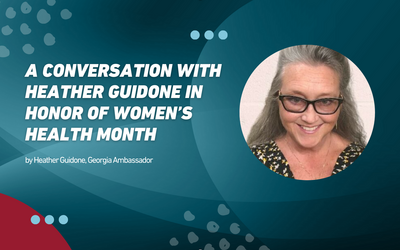
Each May we celebrate Women’s Health Month, and for many, it's more than just a mark on the calendar. It's a time to spotlight the unique health challenges that women, girls, and those assigned female at birth face daily. It's a chance to advocate for comprehensive and accessible healthcare, from reproductive services to preventive care, and to support policies that prioritize women's health. This month, we aim to educate our communities on these critical health issues and celebrate the progress we've made while acknowledging the persistent disparities.
For CDC Ambassador Heather Guidone, Women's Health Month is about making sure that patients’ voices are being heard in the policymaking process. We sat down with Heather for a Q&A to understand her journey more fully.
How did you come to advocate for people living with endometriosis, and what is one thing you wish more people understood about life with this disease?
I've spent over 35 years living with endometriosis, a condition that affects countless individuals yet remains shrouded in misunderstanding. When I was diagnosed, resources and discussions about the disease were nearly nonexistent. Now, although there's been significant progress, many still suffer in silence without the support they need. My journey led me to advocate for others, pushing for better awareness, more research funding, and policies that address the severe delays in diagnosis and barriers to care.
The one thing I wish people understood better about living with endometriosis is that it’s not just 'killer cramps.' It's a full-body disease that can profoundly affect every aspect of an individual’s life. It requires a multifaceted approach to healthcare, awareness, and research. Validation of experiences starts with believing those affected, even when they 'don’t look sick.'
What are some of the policy changes you’re working on right now? What has the journey been like to develop the policy, create buy-in, and to move it forward in the process?
One of the most impactful pieces of legislation I've worked on is Connecticut’s HB 6672, spearheaded by Representative Jillian Gilchrest. This law establishes and funds an endometriosis data and biorepository program to advance innovative research. It’s not just symbolic — it’s a concrete step toward unlocking answers and improving treatments. Working with legislators at both state and federal levels, including presenting at a Congressional Screening of the film "Below the Belt," has been pivotal to push the needle forward. These efforts highlight the need for better education, support for those suffering, improved disability resources, and access to care.
Despite these strides, convincing policymakers is often challenging due to misconceptions about endometriosis being just a 'bad period.' Educating them about the real impact—chronic pain, infertility, productivity loss, and a staggering $70 billion annual cost—helps garner support. When they see the data on how deeply endometriosis affects lives and society, they’re more willing to champion the cause.
Aside from policy and legislative work, what other educational or advocacy efforts are you working on?
I work in the clinical setting as well at a leading endometriosis centers that treats patients from around the world, so there is always an opportunity to support someone through education and advocacy efforts, whether it is providing them and their loved ones personally with information so they can make informed choices, working to get their care approved by insurance, or everything in between. I am also a member of many active coalitions, working groups and collaborations, so there is endless work to be done.
It's really important to be an ally in every aspect of the healthcare infrastructure so we can promote health equity, improved access to care, and dismantling health disparities not just for women, girls and gender diverse folks with endometriosis, but within the healthcare system and broader society as a whole.
Women's Health Month is about making sure that voices are heard, needs are met, and that we continue to push for a future where health equity is a reality for all.
Thank you to Heather for sharing her perspectives and for her continued advocacy efforts to uplift women’s health care. If you are passionate about advocating for women-centered health care policy, we encourage you to sign up to be an ambassador.